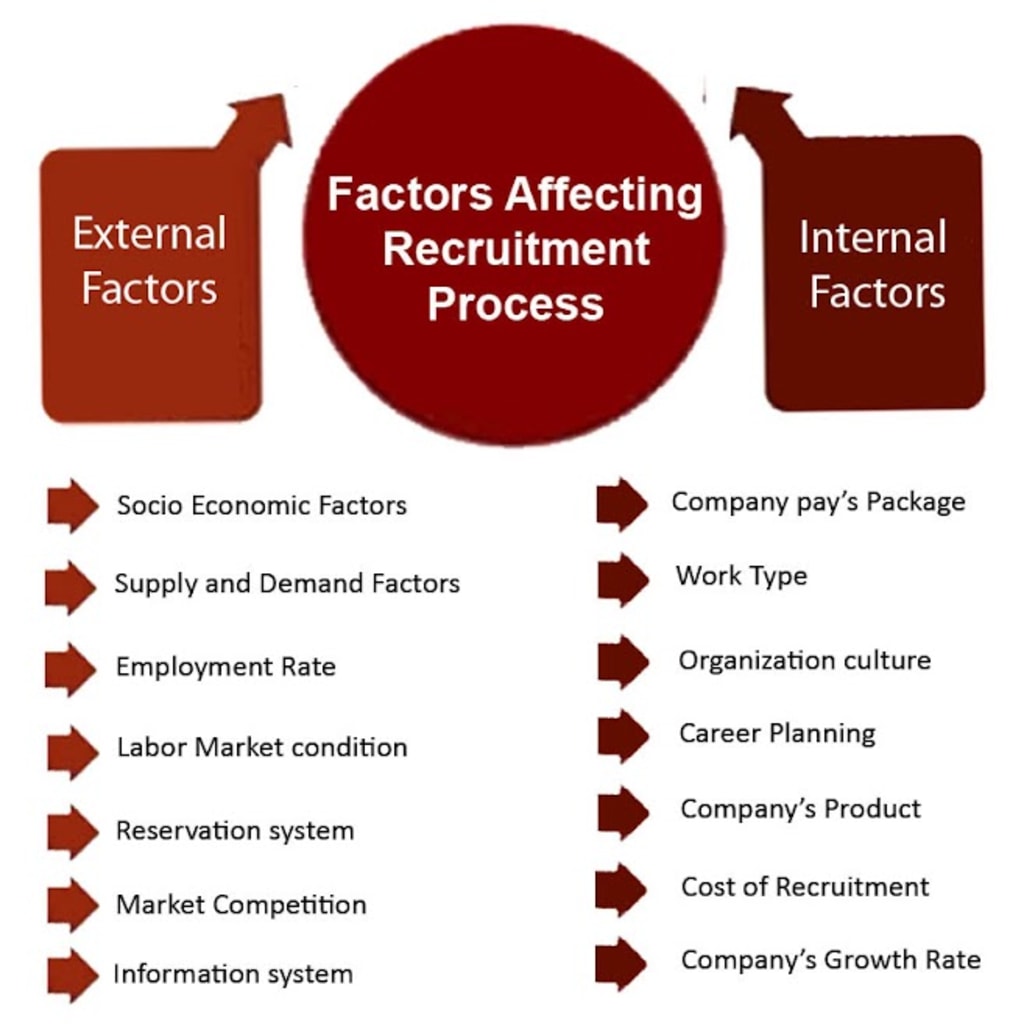Factors Governing Recruitment in Human Resource Management
Navigating the Path to Talent Acquisition Excellence

Recruitment, a fundamental component of Human Resource Management (HRM), plays a pivotal role in shaping an organization's success. The process of attracting, identifying, and selecting the right individuals to join a company's workforce is influenced by a multitude of factors. Understanding and effectively managing these factors is essential for creating a robust recruitment strategy that aligns with organizational goals and secures top-tier talent. In this article, we will explore the key factors governing recruitment in HRM and their impact on talent acquisition.
**1. Organizational Objectives and Strategy:
A crucial determinant of recruitment is an organization's objectives and long-term strategy. The type of talent required, the skills in demand, and the company's expansion plans all influence the recruitment process. For instance, if an organization aims to expand its digital presence, it will need to recruit professionals with digital marketing expertise.
**2. Labor Market Conditions:
The external labor market's dynamics significantly impact recruitment efforts. Factors such as the availability of skilled candidates, prevailing wage rates, and competition from other employers shape how organizations approach recruitment. In a competitive labor market, recruiters may need to offer more attractive compensation packages to secure top talent.
**3. Legal and Regulatory Environment:
Recruitment practices are subject to various legal and regulatory requirements. Equal employment opportunity laws, anti-discrimination legislation, and regulations related to diversity and inclusion shape how organizations attract and select candidates. Adhering to these laws ensures fair and ethical recruitment practices.
**4. Technology and Social Media:
The digital age has revolutionized recruitment by introducing innovative tools and platforms. Social media, online job portals, and applicant tracking systems have transformed how organizations reach potential candidates. Harnessing these technologies enables organizations to cast a wider net and engage with candidates more effectively.
**5. Employer Branding and Reputation:
A strong employer brand and positive reputation in the industry contribute to successful recruitment. Organizations with a compelling brand narrative and a reputation for valuing their employees attract a larger pool of high-quality candidates. Prospective employees are drawn to organizations that align with their values and offer a positive work environment.
**6. Demographic Trends:
Demographic shifts, such as generational differences in the workforce, impact recruitment strategies. Understanding the preferences and expectations of different generations – from Baby Boomers to Gen Z – helps tailor recruitment efforts to resonate with diverse candidates.
**7. Internal Workforce Planning:
The organization's internal workforce needs and gaps influence recruitment decisions. Identifying skills shortages and succession planning guide recruitment efforts to ensure a smooth transition of talent and continuity in key roles.
**8. Budget and Resource Allocation:
Recruitment activities require financial resources, including advertising, technology, and personnel. The budget allocated for recruitment affects the extent to which organizations can invest in various sourcing and selection methods.
**9. Competitive Analysis:
Analyzing the recruitment practices of competitors provides insights into industry trends and benchmarks. Understanding what competitors are doing allows organizations to refine their recruitment strategies and stand out in a crowded market.
**10. Cultural Fit and Diversity:
The cultural fit between a candidate and the organization, as well as the drive to promote diversity, influence recruitment decisions. Organizations seek candidates whose values and behaviors align with the company's culture while also valuing diversity to bring in a range of perspectives.
In conclusion, the recruitment process in HRM is a complex interplay of internal and external factors that shape an organization's talent acquisition efforts. By acknowledging and effectively managing these factors, organizations can build a recruitment strategy that attracts, identifies, and selects candidates who contribute to the company's growth and success. A holistic approach to recruitment, aligned with organizational objectives and responsive to market conditions, is the key to securing and nurturing top talent in today's dynamic business landscape.
About the Creator
HRhelpboard
HRHelpBoad is the best place where all HR people can get easy solutions to their queries related to Human Resource.






Comments
There are no comments for this story
Be the first to respond and start the conversation.